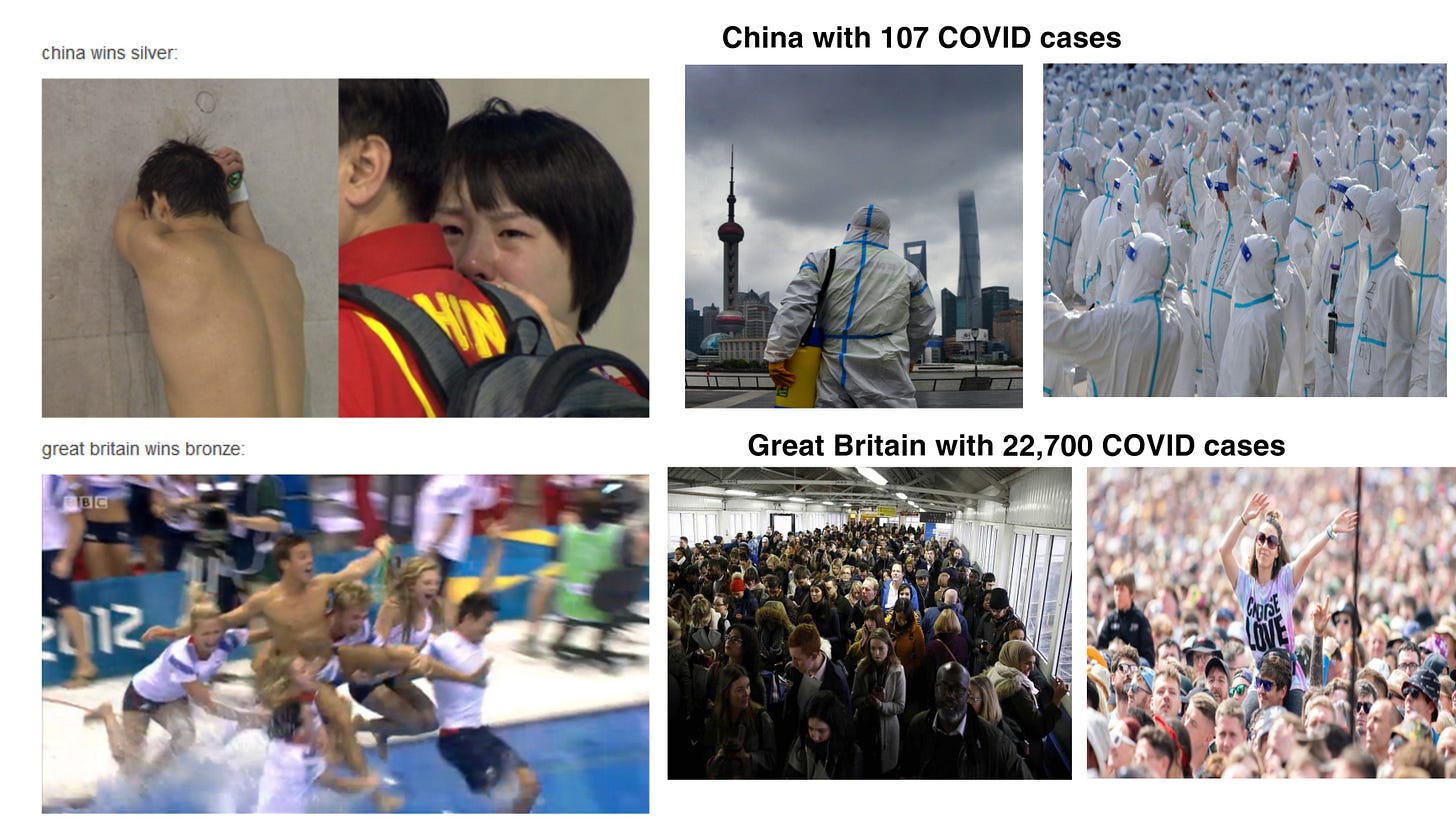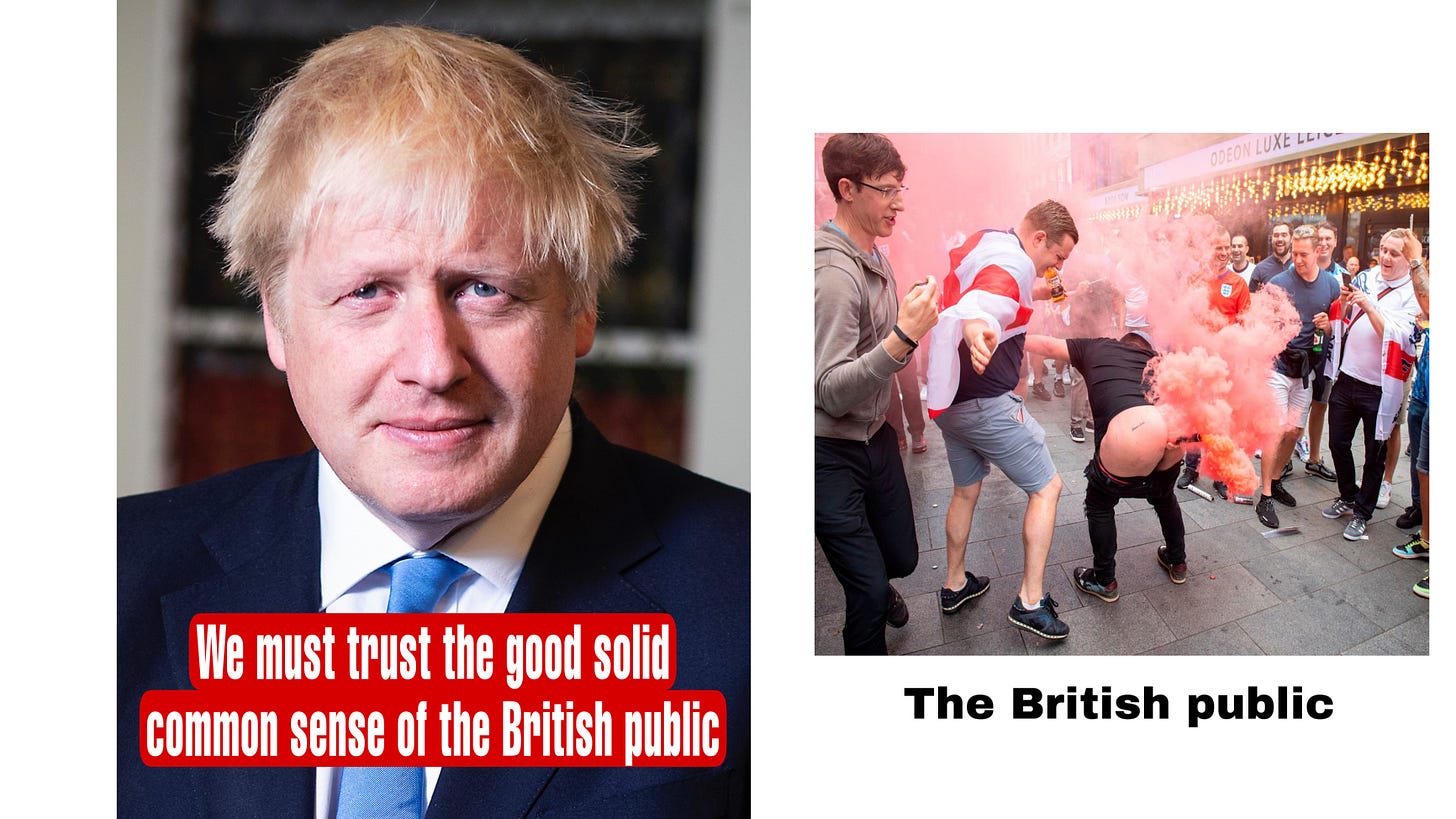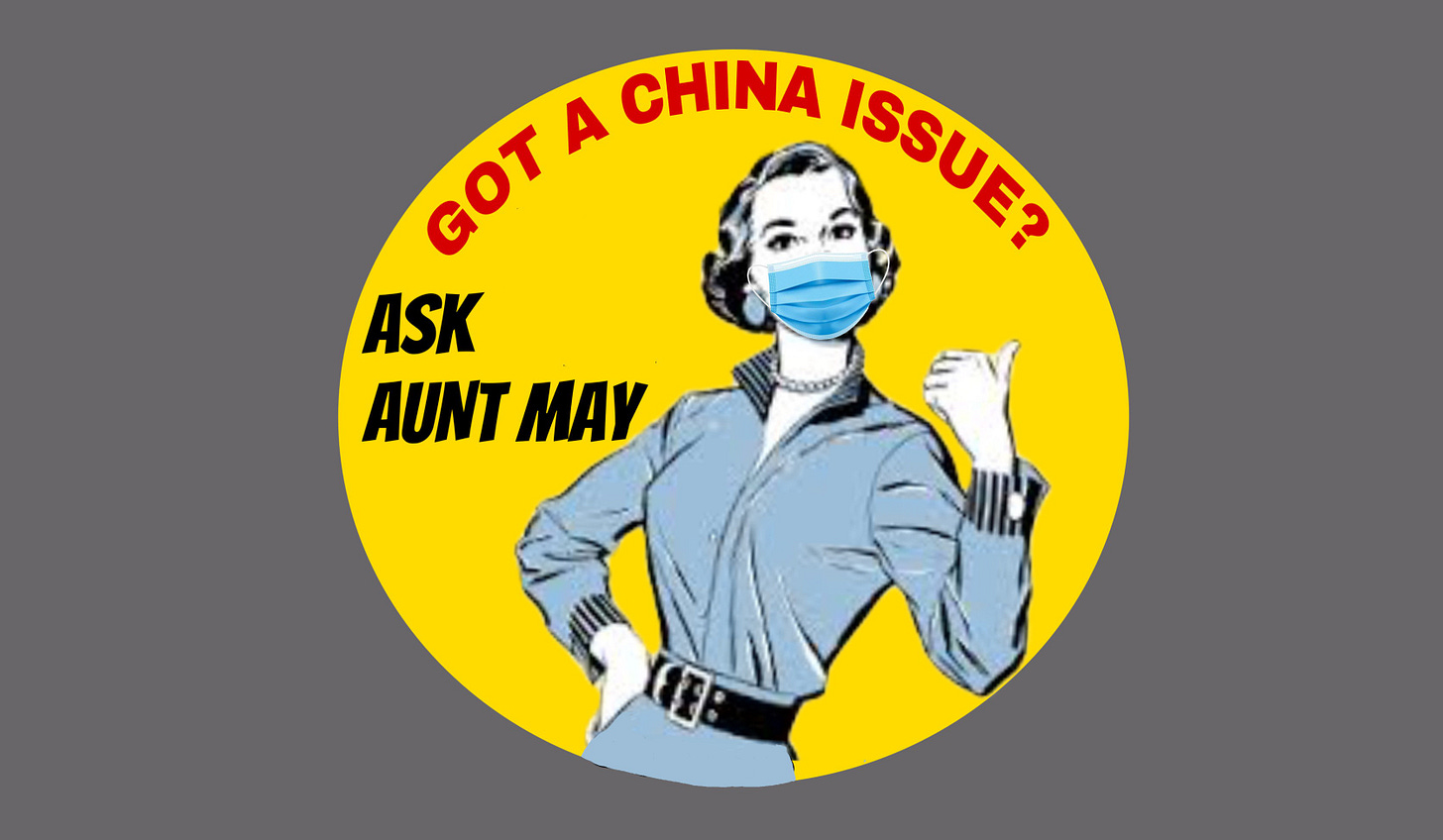ISSUE 7: MUSINGS ON COVID LOCKDOWNS
A COMPARISON BETWEEN CHINA’s DYNAMIC COVID ZERO AND UK’s ZERO WORRIES POLICY
Please note all content is personal opinion only. This does not reflect the opinion of my employer or indeed anyone else. Indeed, it may not even reflect my opinion later today.
China and the United Kingdom are taking very different approaches to COVID.
When I arrived at Pudong airport I was checked for a 48 hour negative PCR test, deserted, those in the airport were all of course wearing masks, the vibe was of brewing discontent and stress … I had expected relief and happiness. The air lines boarding team scrutinised every minute detail – your passport, your right to live in UK, your covid status, then as you leave you need to fill in an online customs form which caused confusion at the immigration entrance …. All this for people leaving the country.
Comparison of PRC and UK attitudes to COVID travel
I flew out of Shanghai on a SAS flight – by the time dinner was served most passengers had already adopted a very half-hearted approach to wearing masks … many below the nose ... some slung low below the chin and a few dispensing with masks fully.
Upon arrival in London airport things could be scarcely different from leaving Pudong … no checks … no masks … no real mention of COVID. The only similarity was stress as the system seemed to buckle over staffing shortages. Environmentalists who had claimed that COVID’s silver lining is that people dropped the habit of mass travel failed to reckon with humankind’s intrinsic hedonism – I want my flight to Majorca… and I want it now!
Where Pudong airport had been like a ghost town Heathrow was heaving with life. Indeed, too much life as it took over 1 and half hours to exit immigration.
People are over COVID and the new kid on the block is Monkeypox. As Monkeypox seems not to be especially infectious and there already is a vaccine and treatment available my guess is the media was just looking for the next pandemic crisis and Monkeypox was a name too good to ignore. Despite the efforts of the Daily Mail and others of its ilk Monkeypox is unable to make much headway – in the UK it is difficult to imagine a lockdown because of COVID, monkeypox, Ebola or anything else.
China view of COVID
During my stay in Shanghai one of the greatest fears was if a bus arrived at your compound and guys in hazmat suits (Dabai) disembarked for a clean up. This would likely mean that there was a COVID case in the compound – the Dabai would enter the infected persons apartment, remove and destroy all food, fumigate the apartment with a chlorine solution and the infected person would be sent off to a COVID camp hospital until testing negatively twice (this normally involved a 7-10 day stay).
In addition, your neighbours on your floor and the floors above and below will also be sent to centralised quarantine for a week and close monitoring.
UK view of COVID
The UK takes a … more relaxed view on COVID and rely on the common sense of the public.
Perhaps it is best to quote them directly:
“If you have symptoms of a respiratory infection, such as COVID-19, and you have a high temperature or do not feel well enough to go to work or carry out normal activities, you are advised to try to stay at home and avoid contact with other people.”
Accordingly, in the UK if you have COVID it is advisable but not mandatory to stay at home!
QUESTIONS PEOPLE HAVE RE SHANGHAI LOCKDOWN
Upon returning to London people have asked the following questions:
Did you think it was a good idea to visit Shanghai during the lockdown?
No.
To be fair (to me) though this was the first time Shanghai has been in lock down this hard or long (there was a brief one back in 2020). Everyone thought Shanghai was too big and too important to lock down for an extended period. Wuhan and Xian had been locked down but they are not … Shanghai!
Perhaps a bigger surprise on reflection was that most of us believed that the lockdown was going to be only for 4 days (it ended up being for 2 months).
How tough was Shanghai’s lockdown?
My impression is that Shanghai’s lockdown was tougher than similar European lockdowns – no going to the supermarket, no pharmacies, no exercise – but not as inhumane as often portrayed in Western media. Many poorer people suffered greatly but this is not unique to China’s lockdown.
One group that suffered in particular were the elderly – Shanghai’s lockdown was in many ways an e-lockdown. Many elderly Chinese people have modest lives and do not own a smart phone. A smart phone is needed to show your PCR test result and obtain the green code. Without a green code you cannot not go about your normal life (e.g. get on a bus, enter a shop or even come back home). Many older residents also rely upon their family – isolation hit them especially hard.
I think many forget how tough Western lockdowns were - in London there was no mixing outside your social bubble, difficulties accessing medical care, you could not visit critically ill loved ones, no funerals, … it was a lonely and isolating time. Shanghai’s had all that toughness and more … but its advantage was its relative brevity and geographic containment. If China was doing its lockdown when the West was doing theirs I assume it would not have been much of a media topic.
What do the Chinese people think about COVID-19 zero policy?
Well it is difficult to claim to know what 1.4 billion people are thinking.
However, on balance I think most people not locked down are in favour of COVID zero policy. I am sure if you ask 100 random people in, say, Chengdu they would think that the Shanghai lockdown should be tougher and longer. However, people caught up in lockdown the policy was detested to various extents.
My experience was that younger people (i.e. from 20s to 30s) were often outraged and extremely pissed off at the government. The middle aged were often more concerned about whether this policy was a sign of a more restrictive government that is here to stay. The older people often had understanding for the policy and scored the authorities highly for trying to protect the people. Expatriates felt in the main powerless and many felt that it Shanghai’s best years (at least for them) were over.
Many of my Chinese friends and colleagues expressed that they really missed overseas travel. None said they were thinking of moving overseas permanently – I am sure there are some but I think the overwhelming majority are being stoic and hope to see an end to their relative isolation. There were also for the first time in my experience real concerns about the economy – even in the global financial crisis in 2008 China slowed down but did not stop. This year may prove to be tougher than expected.
The lockdown has hit Shanghai’s confidence in itself. Shanghai always prided itself as the city that works. When there is a crisis in China the authorities would typically send in the Shanghai cadres to put things right.
This time things did not go according to plan. Shanghai’s response compared poorly with Shenzhen’s. Shanghai may need to be more hungry for investment and activity as it does seem the economic power of China is drifting south. Shenzhen and the Greater bay will pose a greater long term challenge to Shanghai than COVID.
When I arrived in Shanghai in March people felt COVID 19 was a mix of ebola and dynamite. If you would tell them someone in the London office had contracted COVID 19 this would trigger sad shaking of heads as if someone had been diagnosed with stage 4 cancer.
However, as time went on and most people realised the vast majority of cases were asymptomatic with most people recovering quickly. The first day when deaths were announced included a sprightly 86 year old and the oldest victim was 105! Within a month people attitude changed to them not being scared of COVID 19 but of government policy. The primary fear was being sent to the COVID camps.
How bad was the COVID camp? Why did you go?
My COVID experience was very much a blocked nose for one day. My initial reaction was how can I manage to stay in the apartment. However, every RATS test I self-administered had a scarlet line – I was clearly positive.
When they came knocking I trudged off – my logic was it is their country, their rules. There was no reason for me to be given special treatment.
My PA had been in contact with the CDC and they had assured her that I would be sent to the Chongming island foreigner hospital. She shared photos with me of what looked like a small Swiss chalet nestled in greenery. The self contained units had two beds. In addition, an acquaintance told me her Hong Kong friend had stayed there and found it very comfortable. Another friend told me it was good that I was going to the foreigner hospital as they were of a high quality and they would test you all the time as their aim was to get you out as quickly as possible.
Reassured by this knowledge I quite enjoyed the trip to Chongming island – savouring the trepidation of my fellow travellers – little did they know.
Well it was more little did I know. The bus stopped at the Chongming Island expo Center. This did not look like the brochure! Instead of sharing with one other person I shared with 750 others. The accommodation was camp beds in little cubicles. At night it was surprisingly quiet but the flood lighting was relentless so we “built” a roof over the bed – the structure continued to expand as I pilfered blankets and sheets. The camp was clean and the food was ok. The dabai were friendly and keen to help. Most of the time was spent lying on the bed – looking at the sky. It reminded me of a holiday in Bali. I left 8 days later feeling very revitalised and even had something of a tan.
When will China open up?
My guess is that China will not be opening up any time soon. The infrastructure continues to be built with testing sites being set up throughout the city so you are only ever a 15 minute walk from one. You do not build all this infrastructure without a long term plan to continue in place. My biggest concern at present is that China still relies on mass testing and does not appear to be ramping up its vaccination program. I expect we will for at least another year have limits on foreigners travelling to China coupled with quarantine (possibly reduced to 5 days plus health monitoring – that is daily testing). Accordingly would be premature to book that Hainan Christmas holiday at present.
Will we be able to get our plastic Christmas tree?
Yes.
Even during the lockdown Shanghai kept a lot of the supply chain infrastructure on life support by using “closed loop” work practices. Basically workers would live and work for weeks on end in the factory or port to keep things moving. These unsung heroes meant that a lockdown of 26 million people and the nexus of the China supply chain did not result in the feared backlog. It seems that one big boat in the Suez Canal was more disruptive to global supply chains.
Next Issue: Supply Chain
Even pre-COVID many were predicting a slowing down or even reversal of globalisation.
COVID has added to these expectations as think tanks and governments around the world fear an over-reliance on China manufacturing.
In addition, the geo-political situation is more fraught with consumers and governments alike seeking to tie social/political issues to economics. There is also a general trend of greater awareness in respect of sustainability and ESG issues. These are not always targeting China but will often impact Chinese factories and suppliers.
However, with inflation hitting record levels and demand outstripping supply is there really an appetite on the part of Western business, governments or consumers to try and cut China out of global supply chains? Is it even possible?
See you next week,







A very interesting article with great insights into the Chinese way of looking at covid. I was originally from Hong Kong and used to visit Hong Kong plus China yearly before the pandemic. Your article more or less had dashed my hope of resuming my visit this year... looking forward to 2023.